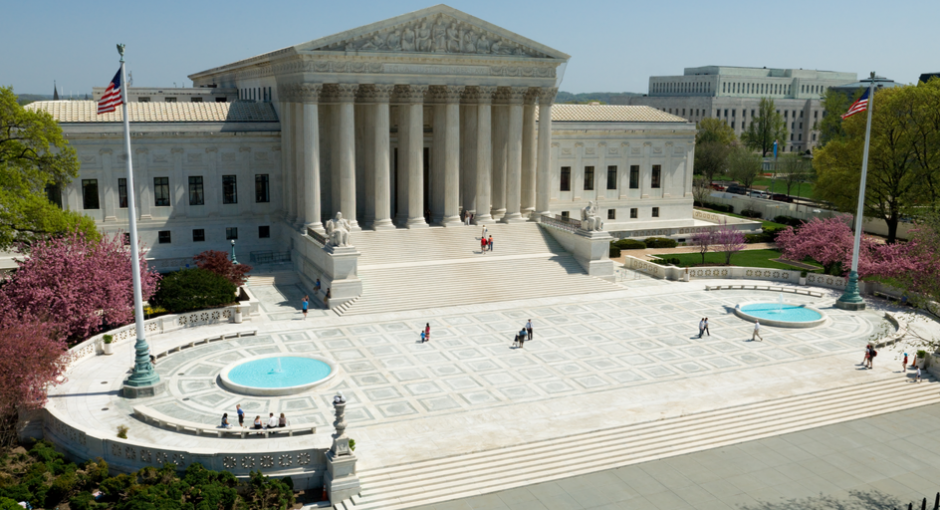Several U.S. Supreme Court justices asked during a hearing today whether the Centers for Medicare & Medicaid Services (CMS) had statutory authority to single out 340B hospitals for a nearly 30% cut in Medicare Part B drug reimbursement beginning in 2018.
The high court this morning heard arguments in three hospital groups and three health systems’ appeal of a federal circuit court’s July 2020 decision upholding CMS’s drug payment cut for 340B disproportionate share hospitals, non-rural sole community hospitals, and rural referral centers. The court is expected to hand down its decision in American Hospital Association v. Becerra perhaps as soon as March.
CMS says the reimbursement cut, which it will continue next year, aligns Part B drug payments more closely with 340B drug acquisition costs and lowers Medicare beneficiaries’ drug copayments.
CMS’s attorney, U.S. Assistant Solicitor General Christopher Michel, told the justices that the hospital plaintiffs incorrectly suggest that the 340B statute ensures 340B providers “a subsidy under Medicare.”
“That cannot be,” Michel said, “because everyone agrees that” the law governing Medicare Part B payments for hospital outpatient drugs lets CMS “set the rate for 340B hospitals at acquisition cost.”
CMS, Michel said, “made a more modest adjustment, requiring 340B providers to share some of their discount with Medicare beneficiaries in other hospitals. That sound approach was well within the agency’s statutory authority, and the decision below should be affirmed.”
The hospital plaintiffs’ attorney, Donald Verrilli, answered Associate Justice Samuel Alito’s question, “Is there any dispute here that the 340B hospitals pay a lot less?” by saying, “No, it’s not disputed.”
“There’s a subsidy here, but, of course, it’s a subsidy that Congress was well aware of” when it wrote the Medicare Part B drug payment law, Verrilli said. In fact, he pointed out, Congress specifically excluded 340B drug discounts provided to hospitals from the law’s definition of average sales price (ASP). Verrilli served as the U.S. Solicitor General from 2011-2016 under President Obama.
Before CMS imposed the reimbursement cut, it paid all hospitals—340B and non-340B—ASP +6% for drugs reimbursed under Part B. It would have been “very odd” for Congress, Verrilli said, to have told CMS to exclude hospitals’ 340B drug discounts from that reimbursement formula, only to let CMS “let it back in the back door by allowing an adjustment that effectively sets a different cost-based rate for 340B hospitals.”
Associate Justices Sonia Sotomayor and Amy Coney Barrett both told Verrilli they thought that was a strong argument.
If CMS wants Medicare to stop subsidizing 340B hospitals, “it’s got two options,” Verrilli said. It can base Part B reimbursement on a cost study and use its statutory authority to vary reimbursement among hospital categories, he said. Or, he continued, “if you don’t want to do that, if you think it’s too burdensome, you think it’s bad policy, you go to Congress and say change the law. But they didn’t do either of those things. Instead, they took a shortcut that the statute doesn’t authorize.”
Associate Justices Alito, Kavanaugh, Clarence Thomas, and Neil Gorsuch all asked questions about one of the high court’s precedents—Chevron v. National Resources Defense Council—that the U.S. Court of Appeals for the District of Columbia Circuit relied on in upholding CMS’s authority to slash 340B hospitals Part B drug reimbursement. In Chevron, the court in 1984 created a two-part test for lower courts to apply when deciding whether to defer to a federal agency’s interpretation of a statute it administers.
Early in the hearing, Thomas asked Verrilli if he was arguing that the court needed to overrule the Chevron decision to get the result the hospital plaintiffs wanted. Verrilli said he thought the court could reject the appeals court’s application of Chevron without getting “to the question of whether Chevron needs to be overruled.”
Alito pressed Verrilli on the same point later during the hearing.
“If the only way we can reverse the D.C. Circuit is to overrule Chevron, do you want us to overrule Chevron?” Alito asked bluntly.
“Yes,” Verrilli answered. “We want to win the case. Yes.”
Kavanaugh took issue with Assistant Solicitor General Michel’s description of the difference between 340B drug acquisition cost and Part B drug reimbursement at ASP +6% as an overpayment.
“The word ‘overpayment’ with respect to 340B hospitals is—is questionable, isn’t it?” Kavanaugh said. “They provide a huge amount of the uncompensated care in the hospital.” Many “are in rural areas.”
“And those hospitals say that—and Congress is well aware of this, and so, to say overpayment, I think, is part of the picture but doesn’t take account of the whole 340B picture, which is more complicated,” Kavanaugh said.
Michel said, “I don’t think it’s as simple as saying 340B hospitals have some kind of distinctive entitlement” to Medicare Part B drug payments that exceed their 340B acquisition costs. “I want to make clear the agency supports the work of 340B hospitals. You know, we made major DSH payments to them. We’re certainly not here saying that—that—that the work is—shouldn’t be valued.”
“What we’re saying is that the Medicare program was not designed to subsidize 340B hospitals,” Michel said.
Michel also pointed to friend of the court filings from a group of rural hospitals and the Federation of American Hospitals expressing support for the CMS cuts.


